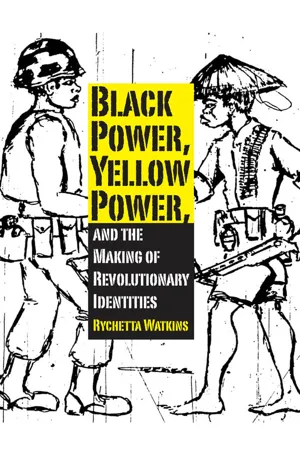
- 176 pages
- English
- PDF
- Available on iOS & Android
Black Power, Yellow Power, and the Making of Revolutionary Identities
About This Book
Images of upraised fists, afros, and dashikis have long dominated the collective memory of Black Power and its proponents. The "guerilla" figure—taking the form of the black-leather-clad revolutionary within the Black Panther Party—has become an iconic trope in American popular culture. That politically radical figure, however, has been shaped as much by Asian American cultural discourse as by African American political ideology. From the Asian-African Conference held in April of 1955 in Bandung, Indonesia, onward to the present, Afro-Asian political collaboration has been active and influential. In Black Power, Yellow Power, and the Making of Revolutionary Identities, author Rychetta Watkins uses the guerilla figure as a point of departure and shows how the trope's rhetoric animates discourses of representation and identity in African American and Asian American literature and culture. In doing so, she examines the notion of "Power, " in terms of ethnic political identity, and explores collaborating—and sometimes competing—ethnic interests that have drawn ideas from the concept. The project brings together a range of texts—editorial cartoons, newspaper articles, novels, visual propaganda, and essays—that illustrate the emergence of this subjectivity in Asian American and African American cultural productions during the Power period, roughly 1966 through 1981. After a case study of the cultural politics of academic anthologies and the cooperation between Frank Chin and Ishmael Reed, the volume culminates with analyses of this trope in Sam Greenlee's The Spook Who Sat by the Door, Alice Walker's Meridian, and John Okada's No No Boy.
Frequently asked questions
Information
Table of contents
- Cover
- Contents
- Acknowledgments
- Introduction: Developing a Critical Perspective on Power in Literature
- Chapter One: Translating Fanon: Black and Yellow Power as American Anticolonialisms
- Chapter Two: From Gorilla to Guerilla: Defining Revolutionary Identity
- Chapter Three: Power and the Ivory Tower: Academics as Intellectual Guerillas
- Chapter Four: Reading Resistance: The Guerilla in Literature
- Chapter Five: Promise vs. Praxis: The Legacies of Power
- Notes
- Bibliography
- Index